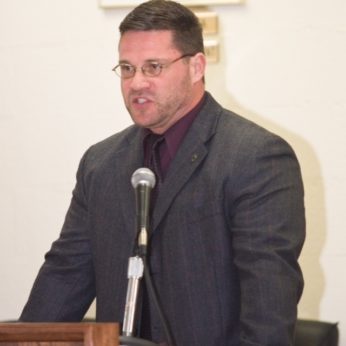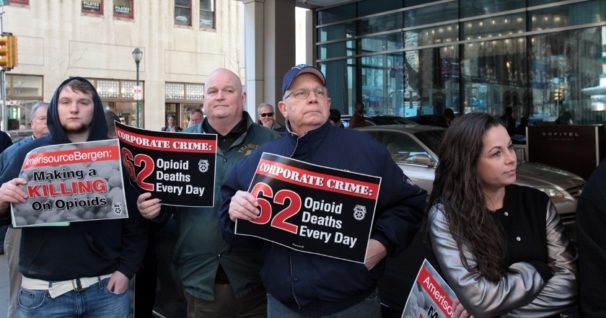
Travis Bornstein never told his friends about his son Tyler’s drug problem. He was too embarrassed.
Then, on September 28, 2014, Tyler’s body was found in a vacant lot in Akron, Ohio. The 23-year-old had become addicted to opioid pain killers after several sports-related injuries and surgeries. Unable to afford long-term treatment, he ultimately turned to a cheaper drug – the heroin that killed him.
“Now I have no choice but to speak out,” the elder Bornstein, president of Teamsters Local 24 in Akron, told a crowd of thousands at the union’s convention in 2016. As he shared the unvarnished tale of how a middle-class, star athlete wound up in that vacant lot, Bornstein lit a fire under the 1.4-million-member organization.
The Teamsters pledged $1.4 million for a nonprofit organization the Bornstein family set up to expand treatment for addicts in Ohio. They’re also going after the drug industry CEOs who’ve been profiting off a national opioid problem of epidemic proportions.

According to the Centers for Disease Control, the number of overdose deaths involving opioids (including prescription drugs and heroin) has quadrupled since 1999. In 2015, opioid deaths in the United States hit a record-breaking 33,000.
The labor union is targeting the three largest U.S. prescription drug wholesalers – McKesson, Cardinal Health, and AmerisourceBergen – for flooding hard-hit areas with the highly addictive pills.
Between 2008 and 2012, for example, these companies shipped 780 million hydrocodone and oxycodone opioid doses to West Virginia – 433 for every man, woman, and child in the state. During that time period, 1,728 people in the state overdosed on the painkillers.
The companies deny any wrongdoing, pointing the finger instead at corrupt doctors and pharmacists who sell pills directly to addicts and dealers. But as West Virginia Governor Earl Ray Tomblin recently told the Charleston Gazette-Mail, “Obviously, they had to know, with a state this size, and that many pills coming in, that something wasn’t right.”
The Teamsters are using their clout as pension fund investors to demand that drug wholesalers take responsibility for their role in the epidemic, conduct full investigations of their distribution practices, and hold CEOs accountable.
At AmerisourceBergen, for example, CEO Steven Collis hasn’t coughed up a penny of the tens of millions of dollars he pocketed as the firm was reaping opioid windfalls – even though the company has paid $16 million to settle a West Virginia case over their negligence.
The Teamsters are demanding that some of the CEO’s pay be “clawed back,” in the same way that Wells Fargo executives involved in last year’s bogus account scandal had to forfeit some of their compensation.
They’ve made similar demands on McKesson, where CEO John Hammergren’s compensation has amounted to an astounding $368 million over the past five years.

Part of the problem with accountability at McKesson, according to the Teamsters, is the fact that Hammergren serves as both CEO and chairman of the company. The union is filing a shareholder resolution urging the board to appoint an independent chair.
Meanwhile, Travis Bornstein is continuing to speak out, telling his son Tyler’s tragic story to students, policymakers, and others as he works to expand the availability of drug treatment for communities ravaged by the opioid crisis.
Since Tyler’s death, he’s learned that opioid addiction isn’t a moral failure, but rather a disease, like cancer or diabetes. “Now my son is my hero for everything he was able to accomplish with such a gut-wrenching disease,” Bornstein said. “I was the fool.”










